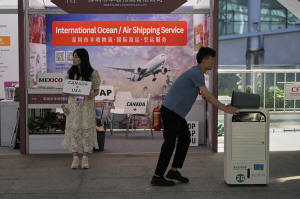US moves ahead on tariffs with investigations into computer chips and
pharmaceuticals
[April 15, 2025] By
ELAINE KURTENBACH
BANGKOK (AP) — The Trump administration has taken its next steps toward
imposing more tariffs on key imports, launching investigations into
imports of computer chips, chip making equipment and pharmaceuticals.
The Department of Commerce posted notices about the probes late Monday
on the Federal Register, seeking public comment within three weeks. It
had not formally announced them earlier.
Although President Donald Trump paused most of his biggest tariff hikes
last week for 90 days, apart from those for imports from China, he has
said he still plans tariffs on pharmaceutical drugs, lumber, copper and
computer chips.
The Commerce Department said it is investigating how imports of computer
chips, equipment to make them and products that contain them — which
include many daily necessities such as cars, refrigerators, smart phones
and other items — affect national security. Section 232 of the Trade
Expansion Act of 1962 permits the president to order tariffs for the
sake of national security.
The probe includes assessing the potential for U.S. domestic production
of computer chips to meet U.S. demand and the role of foreign
manufacturing and assembly, testing and packaging in meeting those
needs.
Among other aspects of the entire computer chip supply chain, the
government intends to also study the risks of having computer chip
production concentrated in other places and the impact on U.S.
competitiveness from foreign government subsidies, “foreign unfair trade
practices and state-sponsored overcapacity.”

After Trump said electronics would not be included in what his
administration calls “reciprocal” tariffs of up to 50% on some nations,
U.S. Commerce Secretary Howard Lutnick explained in an interview on ABC
News that pharmaceuticals, semiconductors and autos will be handled with
“sector specific” tariffs.
“And those are not available for negotiation,” Lutnick said. “They are
just going to be part of making sure we reshore the core national
security items that need to be made in this country. We need to make
medicine in this country,” he said. “We need to make semiconductors.”
The investigation into pharmaceutical imports includes ingredients used
to make such drugs and touches on many of the same aspects of relying on
imports to make them.
[to top of second column] |

A worker holds up a sign for "Canada USA" in front of a logistics
company at the 137th Canton Fair in Guangzhou in southern China's
Guangdong province on Tuesday, April 15, 2025. (AP Photo/Ng Han
Guan)
 Asked about his plans for more
tariffs on pharmaceuticals, Trump said Monday, “Yeah, we're going to
be doing that.”
He said it would be in the “not too distant future.”
“We’re doing it because we want to make our own drugs,” he said.
More than 70% of the materials, or active pharmaceutical
ingredients, used to make medicines made in the United States are
produced in other countries, with India, the European Union and
China leading suppliers. The U.S. produces about a fifth of all
pharmaceuticals made worldwide, but consumes about 45%, far more
than any other country.
The U.S. also is a major producer of semiconductors, but only in
some areas. It relies heavily on imports from Taiwan and South Korea
for certain kinds of advanced chips. In particular, Taiwan dominates
advanced logic chip production at 92% of all fabrication capacity
according to the International Trade Administration, with South
Korea making 8%.
Products like laptops, smartphones and the components needed to make
them accounted for nearly $174 billion in U.S. imports from China
last year. The administration's plans suggest that such electronics
will still be taxed by previous (non-“reciprocal”) tariffs — and
potentially under additional, sector-specific levies.
Although major computer chip makers like Taiwan Semiconductor
Manufacturing Corp. are investing heavily in U.S. manufacturing
facilities, partly due to incentives put in place during former
President Joe Biden's time in office, the costly process of changing
entire supply chains would take years.
Separately, the Commerce Department said Monday that it was
withdrawing from a 2019 agreement that had suspended an antidumping
investigation into imports of fresh tomatoes from Mexico, effective
in 90 days. It said the current arrangement failed to protect U.S.
growers from “unfairly priced” imports of tomatoes. Most tomatoes
from Mexico will be subject to a 20.91% tariff, it said.
All contents © copyright 2025 Associated Press. All rights reserved |